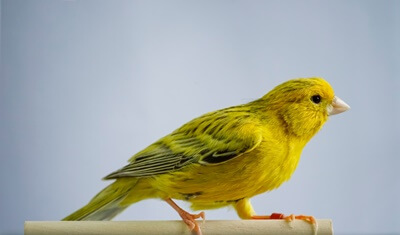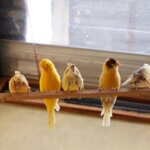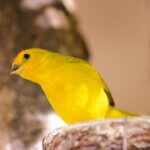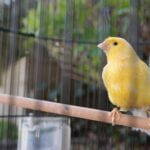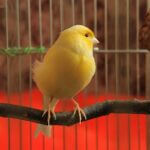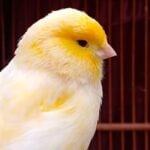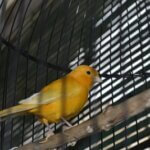Canaries are known for their bright colors and beautiful singing. The term “singing like a canary” belongs in the English vernacular because these songbirds sing long, complicated melodies.
However, there are times when canaries suddenly stop singing, which leaves owners feeling concerned.
Sometimes, this is harmless behavior caused by something temporary, like molting season. In other cases, it may be due to a more concerning problem, like illness or depression.
We’ll explore the reasons why canaries go silent and what you can be done about this issue.
What Causes A Canary To Stop Singing?
You may wake up one day to find your canary silent. For most owners, this is concerning, so they ask, “why is my canary not singing? Is it sick? Did something bad happen to its syrinx?”
However, a lack of singing can be harmless, especially if the silence only lasts a few days or if the canary sings less than it used to, as it might just have decided to be quiet on that day,
These factors need to be evaluated to check if that’s the case:
Female
If your canary has never sung before, the chances are that you have a female.
Many owners discover this upon first bringing their new canary home. Since male and female canaries look identical, you might have purchased a female, expecting it to sing like a male.
Most female canaries don’t sing, and those that do sing tend to be less skillful than males.
Males begin singing once they reach sexual maturity at about 8-12 months old. According to Behavioral And Neural Biology, this is due to anatomical changes to the brain related to song control.
Females lack this ability because songs aren’t used for courting and wooing. Since females don’t need to win over males to reproduce, few lady canaries learn to sing.
If your canary isn’t singing, you should determine its sex. Unfortunately, aside from singing, the only reliable way to determine the sex of canaries is during the breeding season.
The males’ vent will appear elongated and prominent, while females will have a rounder and flatter vent. Outside of the breeding season, the vent of both sexes will look similar.
Stressed or Depressed
Depressed canaries will halt the activities that they used to enjoy, like singing. If your canary used to sing and has stopped suddenly, check if it’s feeling stressed.
Depression, stress, and illness go hand in hand. Depression can lead to stress and vice versa, and stressed canaries are more likely to become ill.
Poor husbandry is the most common culprit of stressed birds. Canaries require a balanced diet, spacious cage setup, the right temperatures and humidity levels, and enrichment.
Although canaries don’t automatically need a companion bird, they spend some time together.
Sick
Various illnesses will decrease the wellness and mood of canaries, including air sac mites, pneumonia, aspergillosis, polyoma virus, canary pox, and pneumonia.
Canaries are prey animals, so they do their utmost to hide the symptoms of illness. This defense mechanism keeps larger animals from specifically targeting them because they’re vulnerable.
The symptoms of illness in canaries include:
- Not singing
- Listlessness
- Weakness
- Poor appetite
- Eating too much
- Sneezing
- Coughing
Once a canary recovers, you might expect it to resume singing, but this isn’t always the case. Some canaries wait until the following spring, even if fully recovered.
Molting
Molting is a process in which canaries lose their old feathers and gain new ones. The only time you should be concerned is if your canary begins shedding its feathers too quickly or molts off-season.
Molting usually takes place in the early fall or late summer. However, this timeframe will change depending on the weather, temperature, and light your canary receives.
The molting process takes about 6-12 weeks.
During this time, your canary may stop singing. If your canary molts off-season, this might also halt its singing. If so, check if you’re confusing your bird’s internal clock with artificial lighting.
You need to mimic the rising and setting of the sun. If you like staying up late, consider putting your canary in a separate room or covering its cage when the lights are switched on.
Why Do Canaries Stop Singing When Molting?
Canaries halt their singing to conserve energy as they undergo the taxing ordeal of shedding and regrowing all of their feathers.
According to The Association For The Study Of Animal Behavior, singing increases the metabolic rate of birds. Researchers noted that birds close to their energy limits might not be able to sing.
The canary should begin singing after the molt. That’s especially true of the winter molt, which will be followed by the spring breeding season.
Do Canaries Stop Singing When They Get Old?
Older canaries may stop singing once they reach their twilight years. However, other factors associated with aging may influence a canary’s ability to sing.
Depending on the canary and its health, its larynx may be compromised by old age, so its songs will be less clear and impressive, discouraging it from singing.
The main reason that male canaries sing is to attract potential mates. With breeding off the table, male canaries no longer need to sing beautiful songs.
Do Canaries Stop Singing In The Winter?
Canaries may limit or halt their singing during the cold winter months. However, this is because canaries rarely molt during this time.
The limited light exposure often triggers molting, which stops the canary from singing.
How To Get A Canary To Sing Again
You can encourage your pet canary to sing again by following these steps:
Give It The Best Care
Canaries that don’t feel safe and cared for will avoid singing songs.
Singing is an expression of happiness and contentment. A canary that lacks food, lives in a noisy environment, and doesn’t get enough exercise will have no desire to sing.
So, evaluate your canary’s living conditions and make lifestyle improvements.
Play Music
Songbirds love listening to and singing music.
If your canary is silent, consider playing light, calm songs that promote participation. Playing music is a good source of entertainment and enrichment, even if it doesn’t get your canary to sing.
Alternatively, consider playing bird songs. It may be that songs from other canaries will encourage it to join in. You can find canary bird songs on YouTube.
Sing Together
Singing to your canary is a good alternative to playing music on your phone or radio.
Why not play your favorite show tunes or a song stuck in your head? Adding a few whistles here and there can pique your canary’s interest.
You don’t have to be the best singer. Begin a melody with your canary, and continue until your bird joins in. This can be a great bonding opportunity for quiet and chatty canaries alike.

